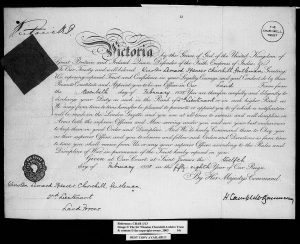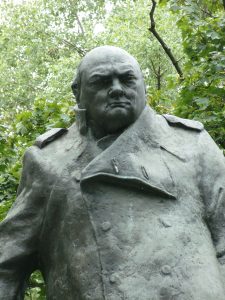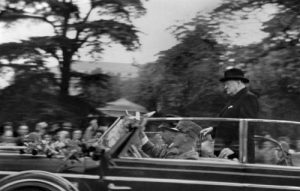
Finest Hour 173
Churchill & France
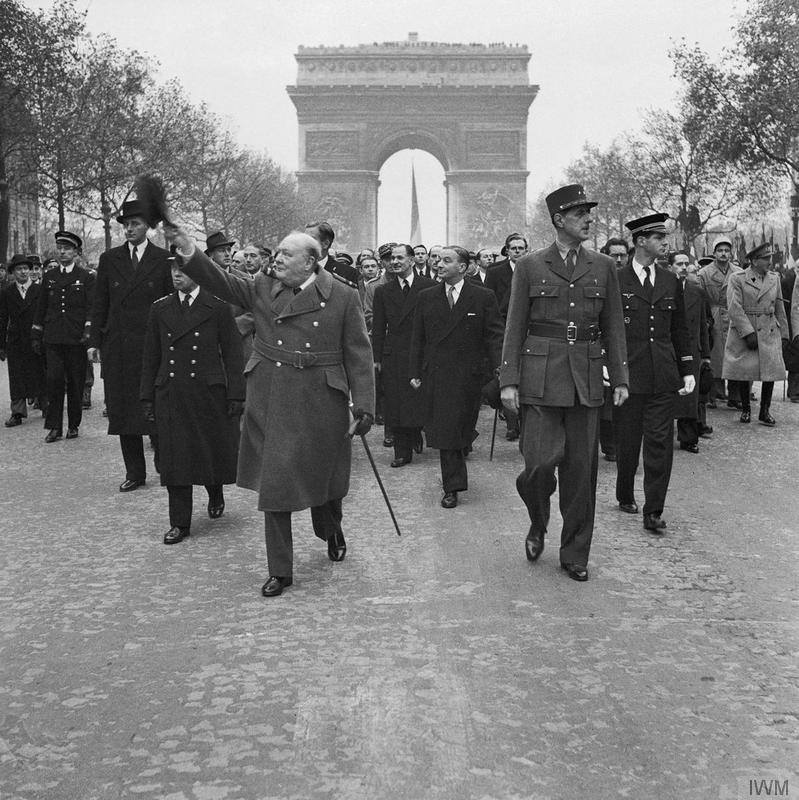
August 14, 2016
Finest Hour 173, Summer 2016
Page 10
By Antoine Capet
Antoine Capet is Professor Emeritus of British Studies at the University of Rouen.
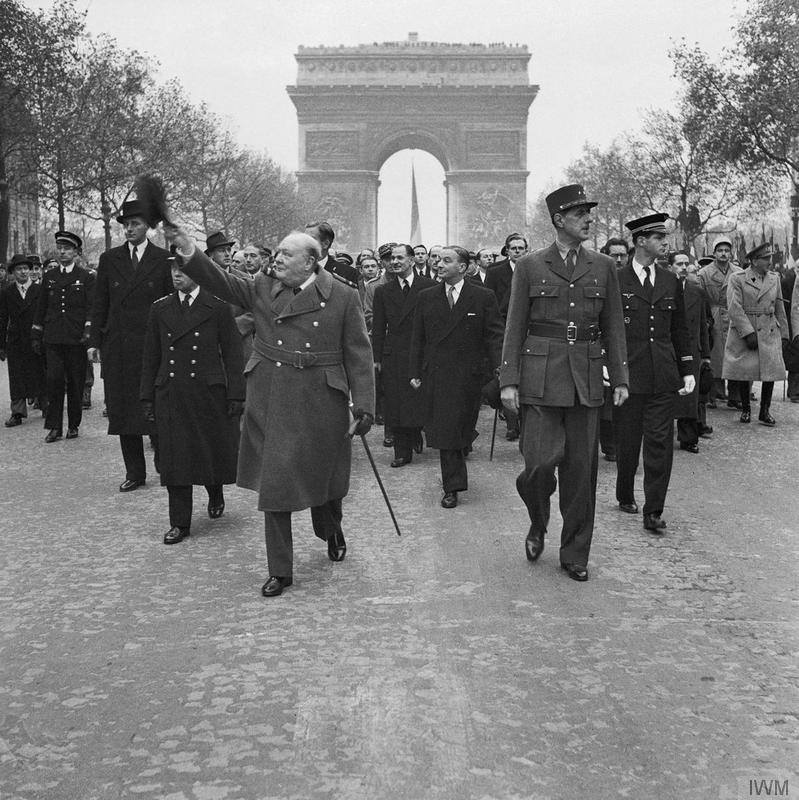
Strangely enough, we have a book on Churchill and Finland,1 but none on Churchill & France— only a number of articles and book chapters. Is it because of the sheer size of the task, considering the vast available sources, including Churchill’s own publications and private correspondence? Or is it because of the contradictory nature of much of this material, which makes it extremely difficult to master? Thirty years after Churchill’s death, Anthony Montague Browne gave us what is arguably the best short summary of Churchill’s attitude to France, from someone who accompanied him in many of his later travels to the country and heard what he had to say at first hand:

2024 International Churchill Conference
When it came to France, ambivalence was again evident. WSC’s love of France was sentimental and long-standing, based on personal experience in peace and war. His greatest heroine, or indeed hero for that matter, was Joan of Arc. But this did not deter him from taking a firm line with the French if he felt it was required, and he told me that after 1940, and their breaking of a solemn agreement not to sue for a separate peace, he never felt the same about them.2
One might add that this ambivalence is often in evidence according as it is Churchill-the-statesman and impeccable British patriot speaking or Churchill-theprivate-man and Francophile. When the interests of France coincided with those of Britain, all was well— there was no conflict of loyalties deep in his heart. But when he felt that they did not and that British interests were threatened, he naturally gave Britain priority. As “Jock” Colville later put it, “de Gaulle’s loyalty was… to France alone. Churchill’s…was merely to Britain first.”3 But when divergences inevitably occurred, Churchill somehow suffered from a sense of guilt towards France which made him irritable, often unpleasant with his pro-French British entourage (one may think here primarily of Anthony Eden) and his French interlocutors (there, de Gaulle springs to mind). But these inner conflicts only came at a late stage in his relations with France and the French—arguably at the time of the Paris Peace Conference in 1919. It seems useful, therefore, to distinguish between several stages in this long relationship, his physical presence in France running from 1883 to 1963—some eighty years, with more than a hundred visits: by far the largest number of his sojourns abroad.
The Start of the Affair
The first obvious connection with France is his parents’ wedding in the Anglican Chapel of the Paris Embassy on 15 April 1974—and the circumstances of his birth, officially “premature” on 30 November, allow us to conjecture that he was in fact conceived in Paris. His first stay in France took place in the summer of 1883, with his father, in Paris.4 Then, when he was 17, in 1891, he was sent to perfect his French at Versailles. It was a success in spite of his initial reticence. When he married Clementine in 1908, he in fact married another Francophile, who had spent some of her youth in Dieppe and spoke excellent French.
It seems that it is with the Agadir Crisis in 1911 that the young politician became fully aware of the converging interests of Britain and France in thwarting German ambitions. At the Admiralty (1911–15) he was an active supporter of Anglo-French cooperation, and it is often forgotten that the decision to launch the joint Dardanelles expedition was taken with the enthusiastic agreement of the French naval staff.5 Admittedly, Churchill was to apportion part of the blame for the failure that followed to the priority given by French Army Generals to the Western Front, but he also deplored that the British Generals had not been more than lukewarm in their support.
When Churchill himself left for the Front in November 1915, serving with the British Expeditionary Force, he soon found himself on the best terms with the French Generals whom he met in the area: all his life he kept the Poilu helmet that General Marie Fayolle gave him.6 He was very impressed by what he saw of the French Army then—an opinion which was reinforced when he became Minister of Munitions in 1917, the reason being that this involved close collaboration with his French opposite number, Louis Loucheur, and frequent visits to France, including the front. The climax was reached in March 1918, when Prime Minister Georges Clemenceau took him on a tour of inspection of the battlefields, which included a stop at Marshal Ferdinand Foch’s Beauvais HQ on the way. The way Foch explained his plans—which turned out to be a complete success—made a profound impression on Churchill, who repeatedly and admiringly related the event in his later writings. The fullest account appeared in a magazine article of 1926, “A Day with Clemenceau,” which he reprinted in Thoughts and Adventures.7 For him, the Beauvais scene encapsulated the best of the two Frances: that of the old Roman Catholic, conservative tradition—the Ancien Régime—(Foch) and that of the Radical atheists of the Republic (Clemenceau). He was awed by the understanding between these two apparently irreconcilable camps before the German peril: both put country before party, and for him nothing could be nobler. Unfortunately, he drew the wrong conclusions from this day, believing that this reconciliation was definitive in the face of Germany, which misled him in the inter-war years.
Le long week-end
Churchill’s ambivalence was clearly visible at the time of Versailles and in the fifteen years or so which followed the Armistice. Churchill approved of Keynes’s reservations as expounded in The
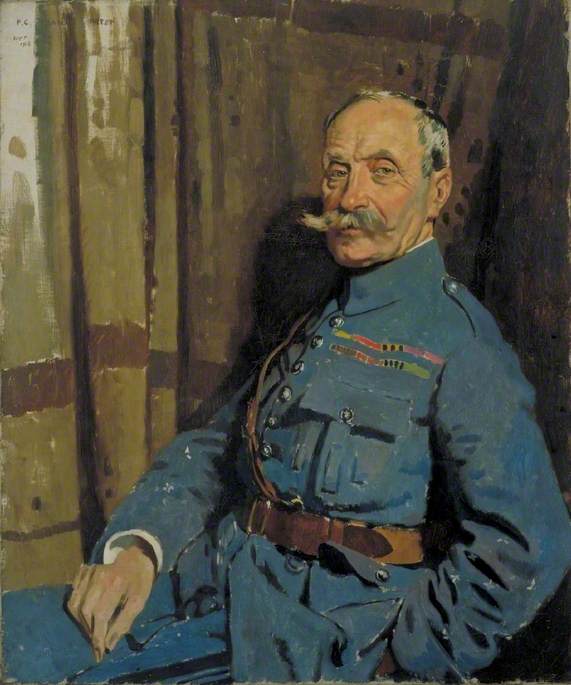
Economic Consequences of the Peace (1919), first, because he believed that Germany must be allowed to enjoy the prosperity to which it was entitled by the undeniable abilities of its people; and second, because pre-war Germany had been an excellent customer of Britain: the sooner its solvency was restored, the better for British export industries in dire need of orders after 1920. Thirdly, because France was no more to be permitted to dominate the Continent than any other country—this was of course a canon of British foreign policy. As Chancellor of the Exchequer, Churchill continued to cultivate his French contacts in high places, no British politician was better informed about opinion in French Government circles than he was.
Exactly when he became convinced that the Weimar Germans were using double talk—agreeing to pacts in favour of peace in public and making plans for rebuilding their war potential in secret—will probably never be established. It is also extremely difficult to say when he finally chose the lesser of two evils—backing France at the risk of encouraging it to make fewer concessions to Germany. That danger seemed to be deliberately forgotten and ignored later in the 1920s, when Churchill wrote his articles in praise of the two great French leaders of the recent war, Foch (1929)8 and Clemenceau (1920)9—the obvious intention being to emphasise the military and other virtues of France.
Churchill’s description of the double face of France and how it was symbolised by the contradictory, yet complementary personalities of the two joint saviours of the country in 1918, as he saw them, has never been bettered. Here, Churchill was clearly “more French than the French.” Indeed, his Francophilia made him seize every occasion to go to Paris, to the French Riviera and to the châteaux of his wealthy British and American friends in France, with many private visits supplementing his official talks in the 1920s.
Clemenceau and Foch both died in 1929, but during “the gathering storm” of the 1930s Churchill never forgot how “in the combination of these two men during the last year of war, the French people found in their service all the glories and the vital essences of Gaul.”10 This explains his famous cri de coeur in the Commons, “Thank God for the French Army,” on 23 March 1933, less than two months after Hitler had become Chancellor of Germany. For the young generation, it would be easy to misunderstand the tenor of what he says of the episode in his Memoirs: “I remember particularly the look of pain and aversion which I saw on the faces of Members in all parts of the House when I said ‘Thank God for the French Army.’”11 Of course the Members mentioned did not foresee the routing of that army in 1940—their “pain and aversion” was directed at Churchill’s plea for a renewal of the military alliance of the Great War.
Le visiteur
Churchill’s isolation in British political circles during his “Wilderness Years” was paradoxically paralleled by his renewed presence among leading French statesmen. Once again, he availed himself of every opportunity to go to France, staying in luxury villas on the Riviera for pleasure or at the Paris Embassy for business. His visit to France in September 1936 is remarkable for the number of important people he met: Pierre-Étienne Flandin, General Joseph Georges, General Maurice Gamelin, now commander-in-chief of the French Army, who took him to the annual manoeuvres. After ten days’ interlude in London, he was back in Paris with Clementine on 24 September, and they had lunch with Flandin, Édouard Herriot, and Paul Reynaud—then a backbench Deputy of Paris. In the evening he delivered a major speech in English at the Théâtre des Ambassadeurs on the importance of Anglo-French cooperation in defence of Parliamentary Democracy and Western Civilisation, in contrast with “the doctrines of Comrade Trotsky and Dr Goebbels.”12
One of the paradoxes is that Churchill’s good French friends were often from the Radical and Socialist Left, including Reynaud, Léon Blum, Édouard Daladier, and Georges Mandel. The list of people he met in Paris during another shorter trip in March, faithfully reported to the Foreign Office by Ambassador Sir Eric Phipps, is most impressive: Reynaud, Blum, Daladier, and Flandin again, along with Marie-René Léger and Joseph PaulBoncour. “He wanted to see a Communist,” Phipps noted, “but I strongly advised against this and he abstained.”13 Thus it is clear that in those days after the recent Anschluss Churchill met all the men who were to count so much in l’heure tragique, to take up the French title of his discussion on June 1940 in The Second World War—with the exception of Pierre Laval, Philippe Pétain, and Maxime Weygand.
What did Churchill say to the French leaders? We know, thanks again to Phipps: “At nearly all the conversations at which I was present Churchill strongly advocated a close Anglo-French alliance, with staff talks… to join together in resisting German pressure.”14 In The Gathering Storm, Churchill mentions the friendly atmosphere with Blum and Reynaud. He also confirms his difficulties with Flandin, with whom he quarreled. And he suggests that the first cracks in his absolute confidence in the French army appeared when hearing Gamelin, in contrast with his views after the manoeuvres in September 1936. This was new because until then he had really been queasy only about the French Air Force. Churchill also left Paris uneasy about the political developments there. Thus it seems clear that by the spring of 1938, behind the façade of absolute faith in French military invincibility in case of attack—he knew of course that what was later called the Maginot mentality precluded any French invasion of Germany—his faith in France’s political will to fight and ability to renew the Union sacrée of the Great War was no longer unshakeable.
Yet one can notice how he was able to back the right horses in the long run— that is, the French leaders who emerged intact from the misdeeds and betrayals of defeatism, occupation, and collaboration. By September 1939, Churchill had broken with Flandin15—and he never got along well with Laval or Pétain. On the other hand, by then his two best political friends in France were Blum and Reynaud. The latter may have been unequal to the situation in May–June 1940, but he was not a traitor—and the same could be said of Gamelin, and also of Georges.
La seconde Guerre mondiale
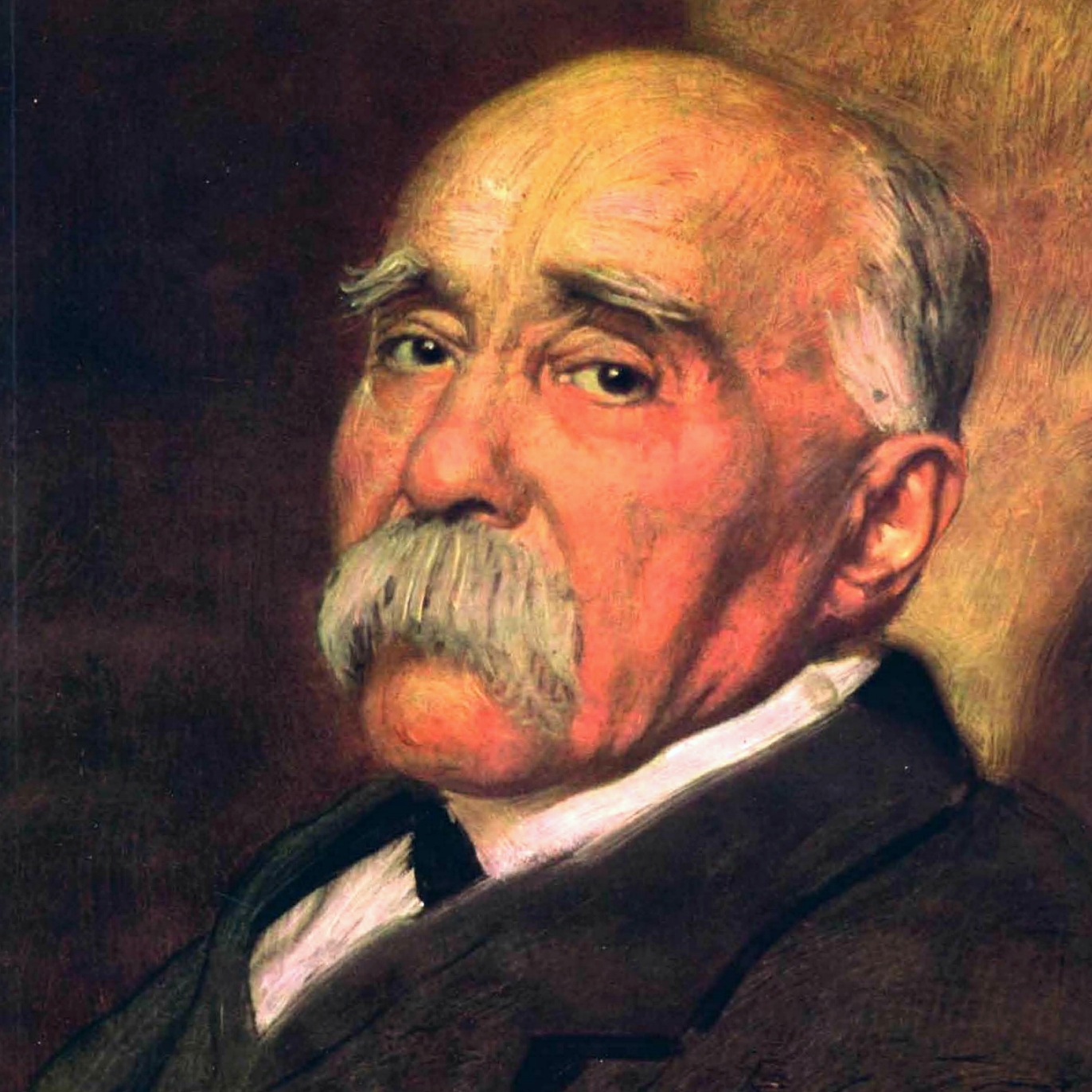
During the “Phoney War” period, which Churchill spent at the Admiralty, he naturally pleaded for the closest possible cooperation with France, as in 1914–18. When he became Prime Minister on 10 May—the day of the German offensive—he never envisaged that the French could sue for a separate armistice. Admittedly, certain choices made by the French from September 1939 did not please him, like the confirmation of Gamelin when he would have preferred Georges as Commander-in-Chief, or their refusal to fill the gap in the Ardennes between the Maginot Line and the Allied Armies. But he was soon to despair of the French and their lack of nerve before the German breakthrough at Sedan.
Hardly ten days after the real start of hostilities, on 19 May, his secretary “Jock” Colville noted in his diary how “Winston [was] expressing his distress at the plight of the French army.”16 On 25 May, Churchill asked the three Chiefs of Staff to examine the options left to Britain if France withdrew from the war. The Dunkirk evacuation was of course linked to their conclusions, like the thorny question—never finally elucidated—of the sending of additional fighter squadrons to France. Churchill uneasily navigated between his military advisers who wanted to keep them and the French who clamoured for more: in so doing, however, he gave excuses to the defeatists.
It seems that it was on 11 June, at Briare, that Churchill realised that all his efforts to keep France in the war had been in vain, particularly when his old friend General Georges intimated that suing for an armistice was inevitable. The confirmation came for Churchill on 13 June, at the Tours prefecture, wither he had come to attend what was to be the last Inter-Allied Council of this phase of the war. On the extraordinary affair of the Franco-British Union proposed on 15–16 June, “my first reaction was unfavourable,” he later wrote.17 In his memoirs, Churchill suggests that in these troubled days he unhesitatingly spotted de Gaulle as “the Constable of France.”18 Still, it would be an exaggeration to say that Churchill staked everything on de Gaulle, since he was careful to keep the possibility of arrangements with Vichy whenever they best served British interests. This infuriated de Gaulle, who is now seen as having been over-sensitive in his denunciation of Churchill’s supposed scheming in the Levant, both at the time and in his war memoirs.
Few historians today accept the Gaullist thesis that a Machiavellian Churchill tried to take advantage of France’s misfortune to further the interests of the British Empire. One has only to consider Churchill’s constant, undeniable efforts to establish the legitimacy of the Free French, first with a British public which was initially unconvinced if not outright hostile, then with the Soviets who were indifferent, and finally with the Americans who had long been negatively influenced by Anti-Gaullists that had taken refuge in their country. The most obdurate of Churchill’s critics cannot deny his efforts finally to obtain recognition of the Free French Government, a seat for France in the Security Council of the United Nations, and a Zone of Occupation in Germany.
Churchill’s inner conflict between his personal tenderness towards France and the harsh facts of Britain’s survival probably reached a climax at the time of the “Greek tragedy,” as he calls it, of Mers el-Kébir (Oran)— when he gave orders to the Royal Navy to open fire on French vessels in July 1940 in the face of Admiral Darlan’s refusal to yield, which was duly obeyed by his subordinates. Three elements were inextricably linked following this “hateful decision, the most unnatural and painful in which I have ever been concerned”19: the enormous relief of warding off the threat of a German seizure of the French fleet, the self-satisfaction of hearing the Parliamentary Conservative Party applauding him unanimously for the first time, but also the realisation of the harm done by the death of so many French sailors to this Anglo-French alliance, which he had so assiduously cultivated since at least 1933. Admittedly, de Gaulle rose to the occasion and put the blame on Vichy’s blind obstinacy—but how many Frenchmen followed him in July 1940?
Churchill patiently strove to heal the wounds, beginning with his fine broadcast in French on 21 October, which few people were in fact able to understand, if only because the German jamming made inaudible the passages which his English accent did not render incomprehensible. Linking it with the Oran tragedy as a sub-text, he suggests that it led to a general forgiveness:
There is no doubt that this appeal went home to the hearts of millions of Frenchmen, and to this day [1949] I am reminded of it by men and women of all classes in France, who always treat me with the utmost kindness in spite of the hard things I had to do—sometimes to them—for our common salvation.20
The great ceremony of reconciliation had to wait until the celebrations of 11 November 1944, when Churchill was the Guest of Honour, sitting on de Gaulle’s right on the official grandstand before being received by the Resistance authorities of the City of Paris who— knowing his taste for military memorabilia—presented him with a Nazi flag taken from the enemy during the Liberation street fights. The harsh constraints of Realpolitik re-emerged as the Nazi peril receded, but Churchill could rejoice once more that his personal feelings coincided with his country’s interests. As he explained at Yalta to President Roosevelt:
To give France a zone of occupation was by no means the end of the matter. Germany would surely rise again, and while the Americans could always go home the French had to live next door to her. A strong France was vital not only to Europe but to Great Britain. She alone could deny the rocket sites on her Channel coast and build up an army to contain the Germans.21
This sounded very much like the “Thank you for the French Army” of 1933. At the same time, Churchill entrusted the great Francophile, Duff Cooper, with the Paris Embassy, which apparently never enjoyed a higher degree of Anglo-French goodwill.
Après la guerre
In his first major post-war speech in France, at Metz on 14 July 1946, Churchill enthusiastically reaffirmed his faith in the Anglo-French alliance, in spite of the events of the 1940s. As Leader of the Opposition from 1945 to 1951, he never ceased to ask the Anglo-American allies, in the Commons, in North America, and during his European tours, to support the rapid recovery of France. Even more remarkable, in the course of his Zurich speech on “The United States of Europe” on 19 September 1946, he proposed for France no less than “the moral leadership of Europe.”22 Those who subscribe to Freudian theories would argue that there was a dimension of self-interest, since a France back on its feet would enable him to resume his travels—in style—to the châteaux and villas which he loved on the French Riviera. He in fact lost no time in taking up his old habits, for he spent a week at Hendaye before going back to Potsdam in July 1945. This was the first of a long series of extended holidays in the South of France, including Monaco, which only ended in June 1963, when he became too weak to leave Britain.
In Paris, he was always received as a major statesman. In May 1947 he was awarded the Médaille militaire by the Prime Minister—dining in the evening with the President of the Republic, Vincent Auriol, a pre-war political friend. At Strasbourg on 15 August 1949, where he received the Freedom of the City, he gave a much- applauded speech to the crowds massed on its largest square. What remains most surprising today is that he scarcely slowed the pace of his visits to France when he was back in power in 1951. Yet, from a political point of view, one can perceive a wide difference between his insistence in Opposition on the restoration of France as a major power and his impatience with the French in 1951–55: by then, they had become an embarrassment for his obsessive pursuit of a summit of the Big Three.
With the burden of the premiership over, France became again only a source of pleasure and honours. Overlapping attractions drew him to it from 1955: his literary agent Emery Reves’s splendid villa, Aristotle Onassis’ yacht, and the Hôtel de Paris at Monte-Carlo. Both hosts organised sparkling dinner parties for him. On his way to the Riviera, he often stopped in Paris. On 6 November 1958 he was made Compagnon de la Libération by de Gaulle, who decided to reopen the Order for him. Churchill was obviously flattered—and on that occasion all the old quarrels were forgotten. Further meetings between the Churchills and the de Gaulles took place at the Nice prefecture and in London. A final source of satisfaction for the aging Churchill was seeing de Gaulle introduce long-overdue stability in French political life, his own political efforts having always suffered from the lack of continuity in government action under the Third and Fourth Republics.
Endnotes
1. Markku Ruotsila, Churchill ja Suomi: Winston Churchillin Suomea koskeva ajattelu ja toiminta 1900–1955 (Helsingissä: Otava, 2002); translated as Churchill and Finland: A Study in Anticommunism and Geopolitics (London: Routledge, 2005).
2. Anthony Montague Browne, Long Sunset (London: Cassell, 1995), p. 160.
3. John Colville, The Churchillians (London: Weidenfeld & Nicolson, 1981), p. 209.
4. Curiously he makes no mention of it in My Early Life (1930). He waited until his speech in Metz on 14 July 1946 to give details of how, on the Place de la Concorde, he “noticed that one of the monuments [that of Alsace-Lorraine] was covered with wreaths and crêpe.” Randolph Churchill, ed., The Sinews of Peace: Post-War Speeches by the Right Hon. Winston S. Churchill (London: Cassell, 1948), p. 171. Randolph is also silent on this first-ever visit to France in the Official Biography.
5. See FH 169, pp. 6–9.
6. Now visible at Chartwell, together with the canvas by Lavery showing Churchill sporting it, “Winston Churchill, Wearing a French Poilu’s Steel Helmet.” A photograph is on line on the National Trust site: http://www.nationaltrustcollections.org.uk/ object/1102452.
7. Winston S. Churchill, Thoughts and Adventures (London: Odhams Press, 1947), pp. 120–32.
8. Winston S. Churchill, “Foch the Indomitable,” Nash’s Magazine, July 1929. Reprinted as “Marshal Foch” in James W. Muller, ed., Great Contemporaries (Wilmington, DE: ISI Books, 2012), p. 184.
9. Winston S. Churchill, “Tiger of France,” Collier’s, 29 November 1930. Reprinted as “Clemenceau” in Great Contemporaries, p. 290.
10. Ibid., p. 291.
11. Winston S. Churchill, The Gathering Storm (Boston: Houghton Mifflin, 1948), p. 77.
12. Martin Gilbert, Winston S. Churchill, Volume V, The Prophet of Truth 1922–1939 (Boston: Houghton Mifflin, 1977), p. 788.
13. Martin Gilbert, ed., Winston S. Churchill, Companion Volume V, Part 3, The Coming of War 1936–1939 (Boston: Houghton Mifflin, 1983), p. 964.
14. Ibid.
15. For their complicated relations, see Richard C. Marsh, “Churchill and Flandin,” FH 157, pp. 22–26.
16. John Colville, The Fringes of Power: Downing Street Diaries (London: Hodder & Stoughton, 1985), p.158.
17. Winston S. Churchill, Their Finest Hour (Boston: Houghton Mifflin, 1949), p. 205.
18. Ibid., p. 215.
19. Ibid., p. 232.
20. Ibid., p. 512.
21. Winston S. Churchill, Triumph and Tragedy (Boston: Houghton Mifflin, 1953), p. 353.
22. CHUR 5/8A–C, Churchill Archives Centre, Cambridge.
Subscribe
WANT MORE?
Get the Churchill Bulletin delivered to your inbox once a month.
